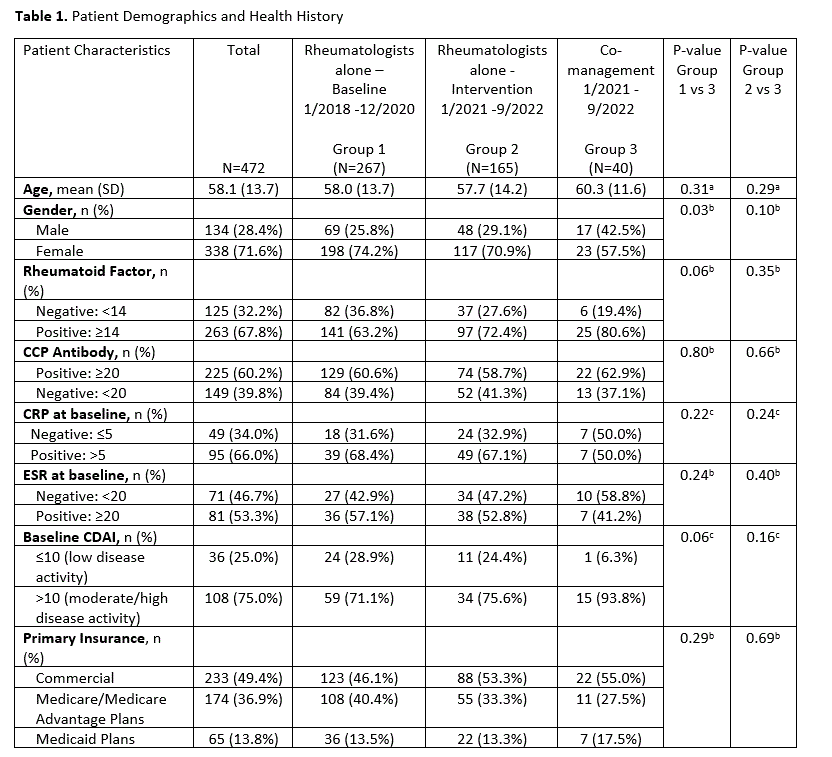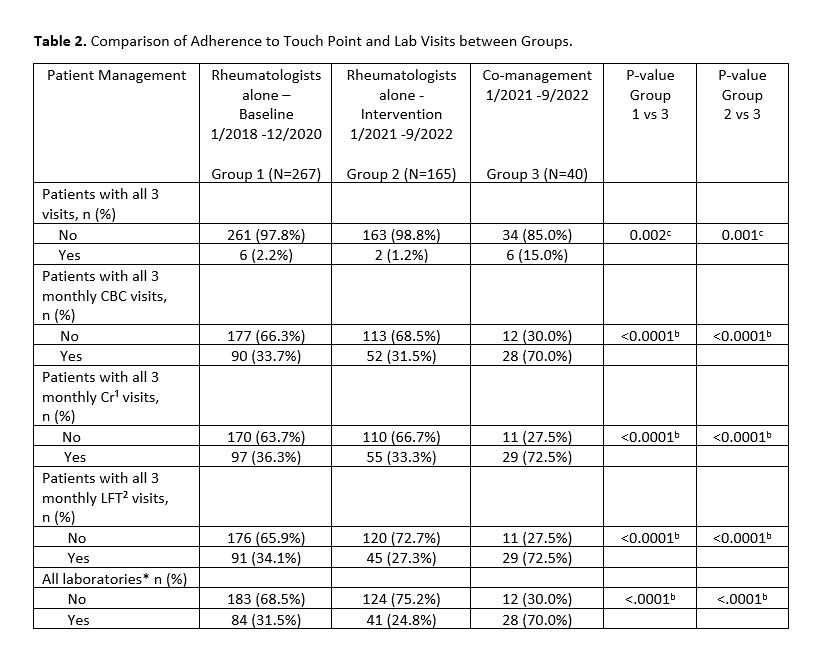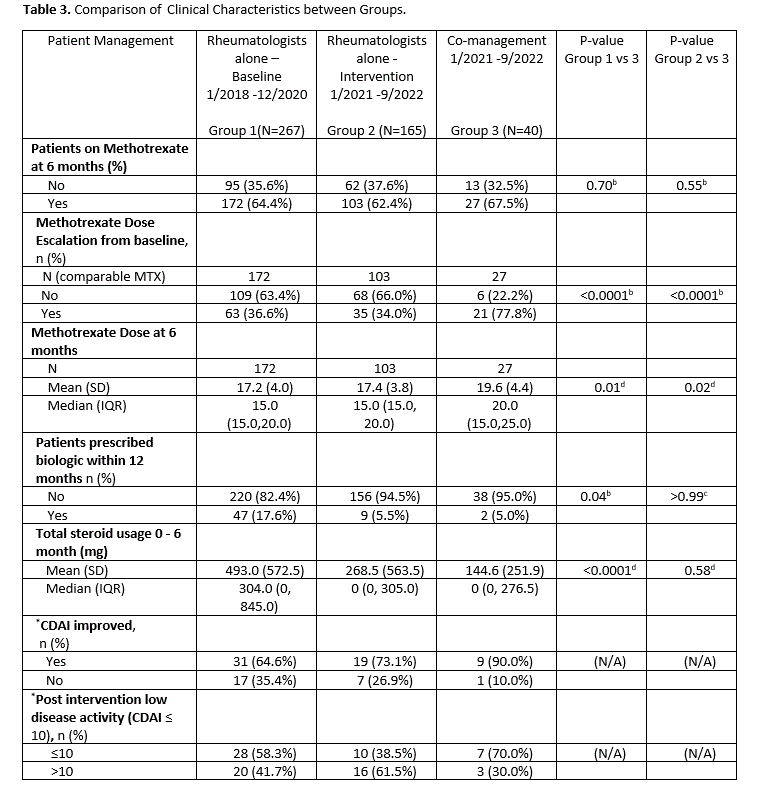Session Information
Date: Tuesday, November 14, 2023
Title: Abstracts: RA – Diagnosis, Manifestations, & Outcomes III: Predicting & Optimizing Outcomes
Session Type: Abstract Session
Session Time: 2:00PM-3:30PM
Background/Purpose: More effective teamwork can improve patient care. We studied the effect of a Rheumatologist-Pharmacist Co-management program on the quality of care of rheumatology patients starting DMARDs.
Methods: The Rheumatologist-Pharmacist Co-management team used ACR guideline-driven protocols to manage rheumatic patients starting methotrexate (MTX).Interventions included Rheumatologist-Pharmacist visits, laboratory monitoring, medication tolerability assessment, treat-to-target (T2T) dose titration and disease monitoring. Electronic health record (EHR) data was compared for 3 groups -Rheumatologists at baseline, Rheumatologists at intervention and Co-management at intervention. Patient demographics, adherence with monthly visits and laboratories for the first 3 months after MTX initiation, MTX dose escalation, cumulative prednisone use within 6 months and biologic initiation within 12 months of MTX initiation were analyzed using appropriate statistical measures. Disease activity among the 3 groups was compared by descriptive analysis.
Results: Demographic evaluation showed that the Co-management group was more likely to be RF+ (80.6% vs 63.2% vs 72.4%) and had higher disease activity by CDAI (93.8% vs. 71.1% vs 75.6%) compared to the baseline and intervention period rheumatologist groups (Table 1). For the first 3 months post MTX intervention, the Co-management group was more adherent to all visits and all laboratories versus the baseline rheumatologist group (15% vs 2.2%, p=0.002; 70% vs 31.5%, p< 0.001) and the intervention rheumatologist group (15% vs 1.2%, p=0.001; 70% vs 24.8%, p< 0.001) (Table 2).When compared to the baseline and the intervention period rheumatologist groups, the Co-management group had a higher number of patients who escalated MTX dose to target (77.8% vs 36.6%, p< 0.001; 77.8% vs 34%, p< 0.001) and maximized MTX dose by 6 months (median 20mg vs 15 mg, p=0.01; 20 mg vs 15 mg, p=0.02).Additionally, the Co-management group had lower cumulative prednisone exposure (mean 144.6mg vs 493mg, p< 0.0001; 144.6mg vs 268.5mg, p< 0.58) and fewer patients starting biologics by 12 months of MTX initiation (5% vs 17.6%, p=0.04) when compared to the baseline rheumatologist group. CDAI evaluation post intervention suggested a trend toward more patients with CDAI improvement (90% vs 64.6% vs 73.1%) and low disease activity (CDAI ≤ 10) (70% vs 58.3% vs 38.5%) achieved in the Co-management group vs rheumatologist managed groups respectively, however this analysis is underpowered due to the small Co-management population (Table 3).
Conclusion: Adherence to guideline-driven care is directly correlated with improved patient outcomes. In our study, despite having increased disease severity (higher RF+ and higher CDAI scores pre-intervention), the Co-management group had greater adherence with visits, laboratories and T2T disease management compared to the rheumatologist only groups. Additionally, they used less cumulative steroids within a 6-month period and had better control of their rheumatoid arthritis disease activity. Our Co-management care model shows improved care delivery when compared to usual care and is a model that can be easily replicated.
(b) Chi-square test
(c) Fisher’s Exact test
(b)Chi-square test
(c) Fisher’s Exact test
¹Cr: Creatinine; ²LFTs: Liver function tests
*All laboratories: Collective month 1, month 2 and month 3 creatinine, liver function tests and CBC.
(c) Fisher’s Exact test
(d) Wilcoxon test (Mann-Whitney)
*The values reflected are for patients who had a complete pre and post CDAI.
To cite this abstract in AMA style:
Patel R, Salava K, Newman E, Chronowski J, Grassi D, Harris H, Young A, Udoeyo I, Schroeder L, Bulbin D, Pugliese D, Cote J. Optimizing the Care of the Rheumatic Patient with Rheumatologist-Pharmacist Co-management [abstract]. Arthritis Rheumatol. 2023; 75 (suppl 9). https://acrabstracts.org/abstract/optimizing-the-care-of-the-rheumatic-patient-with-rheumatologist-pharmacist-co-management/. Accessed .« Back to ACR Convergence 2023
ACR Meeting Abstracts - https://acrabstracts.org/abstract/optimizing-the-care-of-the-rheumatic-patient-with-rheumatologist-pharmacist-co-management/



